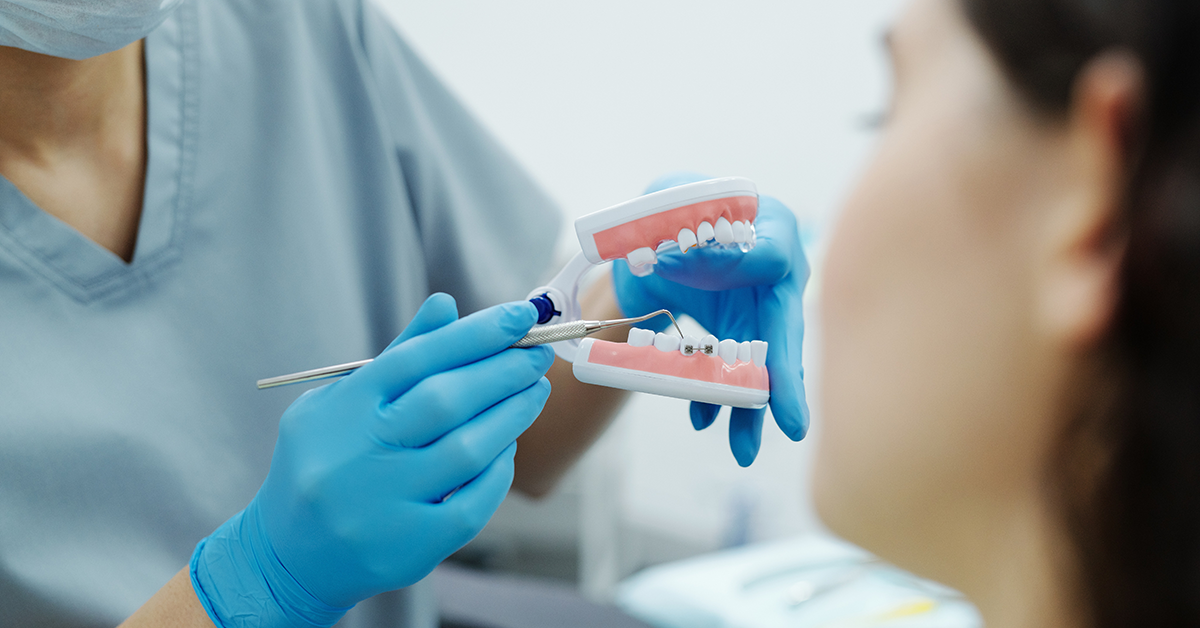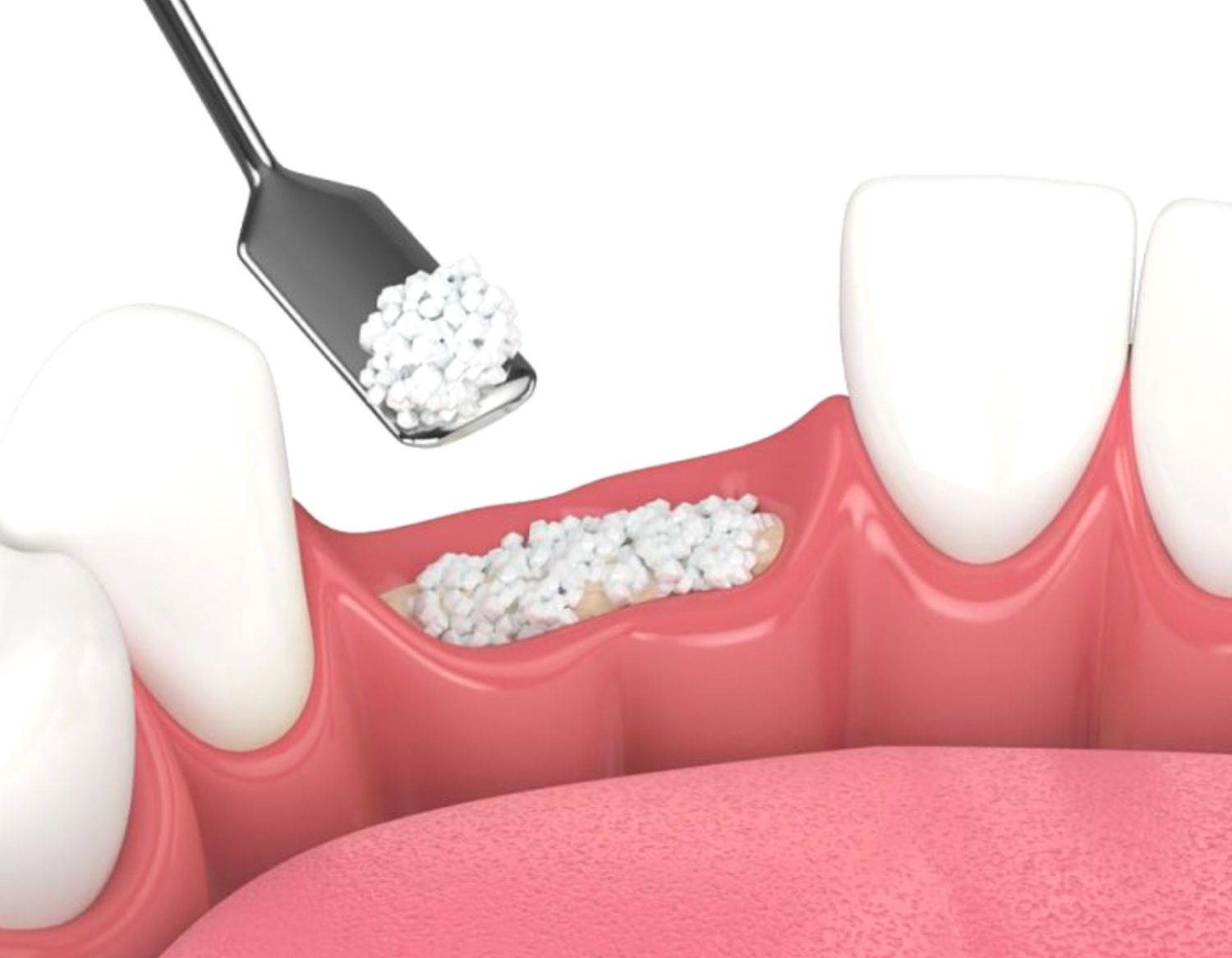At Ava Dental, we provide dental bone graft aftercare instruction before dental implant surgery in case the jaw bone is not of sufficient quality or quantity for implantation. Because the act of chewing puts a lot of pressure on the bone, if the bone is not stable enough to support the implant, implant treatment is likely to fail.
For people who have just had a bone grafting procedure, specific post-operative care instructions should be followed. This will limit complications and ensure the area heals properly and quickly. In this article, we’ll take a look at what you can expect from your dental bone graft aftercare.
How long is the recovery time after bone grafting?
While you’ll likely feel back to normal within a week or two, full healing can take three to nine months – sometimes longer. The exact length of bone graft recovery time depends on the type of bone grafted, the area where the graft was placed, the patient’s ability to heal, the condition of their teeth, and their overall health.
If the patient is about to have dental implant surgery, they will have to wait for the bone graft material to integrate with the jawbone in the mouth, which can take several months. During this time, we will ask patients to visit many times so that the doctor can monitor the healing process of the bone graft.
The length of a dental bone graft aftercare time will not be fixed between patients because each person’s condition is different. It depends on the size of the graft, the general health of the individual, and other variables. In fact, some patients are able to return to their daily routine within two weeks while others require a year to recover and take the next step in the dental implant procedure.
What to expect after the dental bone graft aftercare procedure?
Proper dental bone graft aftercare procedure is critical to the long-term success of the treatment and will help minimize swelling, pain, and infectious complications.
Patients should take pain medication within a few hours of the procedure before the anesthetic wears off. If you don’t want to take prescribed medication, you should take enough over-the-counter pain relievers. After the initial dose, continue to use the medicine at regular intervals for the first two or three days. Antibiotics are prescribed to help prevent infection in the transplanted area.
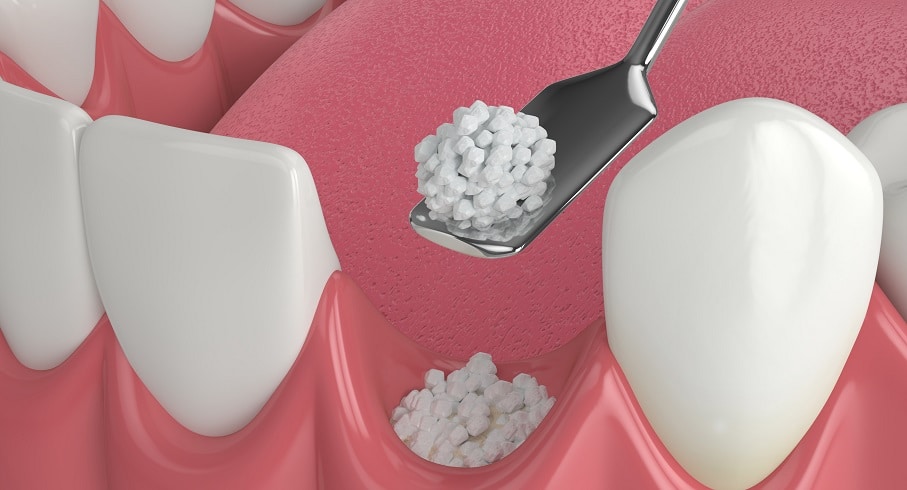
Immediately after the surgery
With each bone graft case, the recovery time, as well as the healing ability of each person, is different. However, every patient should follow some general guidelines:
- The doctor will cover the wound with gauze to control light bleeding. You need to make sure to keep the gauze in place for 30 minutes.
- Avoid touching or rinsing the wound area vigorously, as this can cause more bleeding and cause the clot to dissolve.
- Use pain relievers as soon as the local anesthetic wears off to reduce pain and discomfort.
- Avoid vigorous activity immediately after surgery, especially on the day of surgery. You can then resume your normal activities when you feel comfortable.
- To minimize swelling and pain, you can apply ice to the cheek being treated.
If you have any questions about post-operative care and bone restoration with bone grafting and if anything unusual happens, don’t hesitate to give us a call and talk to your doctor.
Sutures during the dental bone graft aftercare time
The sutures work to help the wound heal faster as well as reduce the bleeding process. They will be removed by the surgeon at the next follow-up visit or the doctors will use self-dissolving sutures, which usually fall off after 5-7 days.
Swelling during the dental bone graft aftercare time
The swelling around your mouth, cheeks, and eyes is large or small depending on the complexity of the surgery performed. Swelling is usually noticeable the morning after surgery and may increase during the first 72 hours. However, there is no need to worry because this is a normal reaction of your body before the wound heals completely.
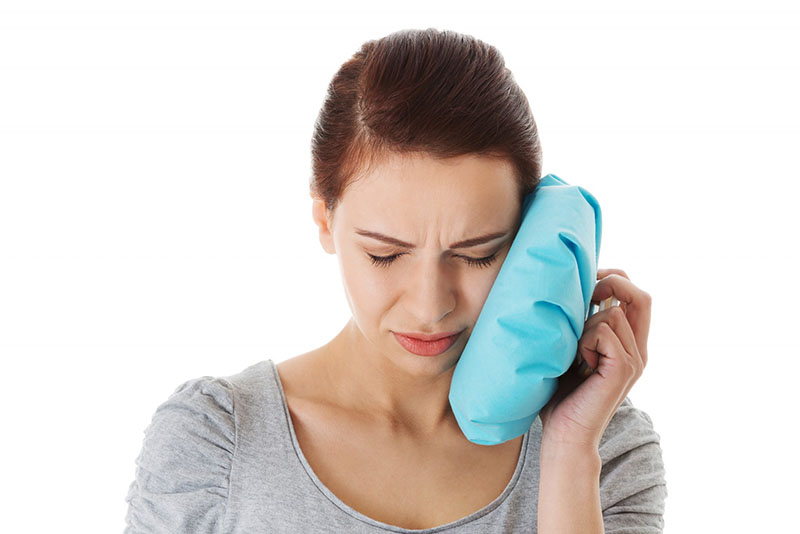
Swelling may appear 1 day after surgery and will go away in 2 to 3 days afterward. You can apply ice to your face at the site of surgery for the first 48 hours after surgery to reduce swelling. Cold compresses help block the blood flow that is common after surgery in the gum tissues. Only apply ice for 20 minutes, then rest for 20 minutes, regularly for the first 24 hours after surgery.
After 36 hours of surgery, ice will have no effect. If swelling or stiffness of the jaw persists for several days, applying moist heat to the sides of the face is beneficial in reducing the size of the bump. Jaw stretching exercises and massaging the cheeks will also help reduce swelling and limit cleft palate. In case the swelling gets worse or if you notice any unusual symptoms, call your doctor right away.
Pain during the dental bone graft aftercare time
After bone graft surgery, the wound can be painful. You need to use pain relievers prescribed by your dentist exactly as directed to minimize pain. You should take pain medication 3 to 8 hours after surgery, as soon as the local anesthetic wears off.
Note, that the use of pain relievers can slow down your reflexes and cause you to stagger. Be sure not to move or drive a lot during this time. Also, avoid alcoholic beverages while taking the drug to avoid side effects from occurring.
In case the pain persists after taking a pain reliever prescribed by your doctor, you can take an over-the-counter Ibuprofen, such as Advil or Motrin. Note, do not take more than 600 mg of Ibuprofen in 6 hours.
Pain relievers can cause nausea, and to minimize this problem, you can eat a light meal 30 minutes before taking the pain reliever. If vomiting persists, you can try taking half the prescribed dose. If you continue to feel nauseous or vomiting, please give us a call.
Antibiotics during the dental bone graft aftercare time
To minimize complications related to infection, your doctor will prescribe antibiotics. You need to take the antibiotics exactly as prescribed and make sure to finish the prescription. Alternatively, you can take a probiotic supplement or eat yogurt to reduce your risk of an upset stomach or yeast infection caused by antibiotics. Note, if you are taking birth control pills, keep in mind that antibiotics can make them less effective.
In case you develop a rash or reaction to an antibiotic, stop the medication and call us right away. If you have nausea or vomiting caused by antibiotics, you need to take any medicine again for at least an hour. Then, when nausea subsides, eat some food half an hour before taking antibiotics or pain relievers.
Other possible complications during the dental bone graft aftercare time
If you suddenly get up or sit up, you may feel dizzy from the pain medicine. Make sure to sit up for at least a minute before standing up to allow your body to acclimate.
Body temperature may rise slightly immediately after surgery, don’t worry because this is the body’s normal response to swelling. You can take Advil (Ibuprofen) to lower your fever. However, if the temperature continues to rise, please let us know.
In case the location to be implanted is deep in the oral cavity, the doctor will have to stretch the corner of the patient’s mouth to conduct surgery. Then, the corners of the mouth may dry out and begin to crack after the surgery is over. At that time, you should moisturize your lips with Vaseline ointment or other lip balms.
Sometimes, the patient can feel hard projections in the mouth with their tongue – these are the bony walls that support the teeth.
Swallowing pain and sore throat are not uncommon reactions after a bone transplant because the muscle adjacent to the surgical site becomes swollen. This should go away in two to three days. You may also find it difficult to open your mouth due to tight jaw muscles and this should subside after a few days.
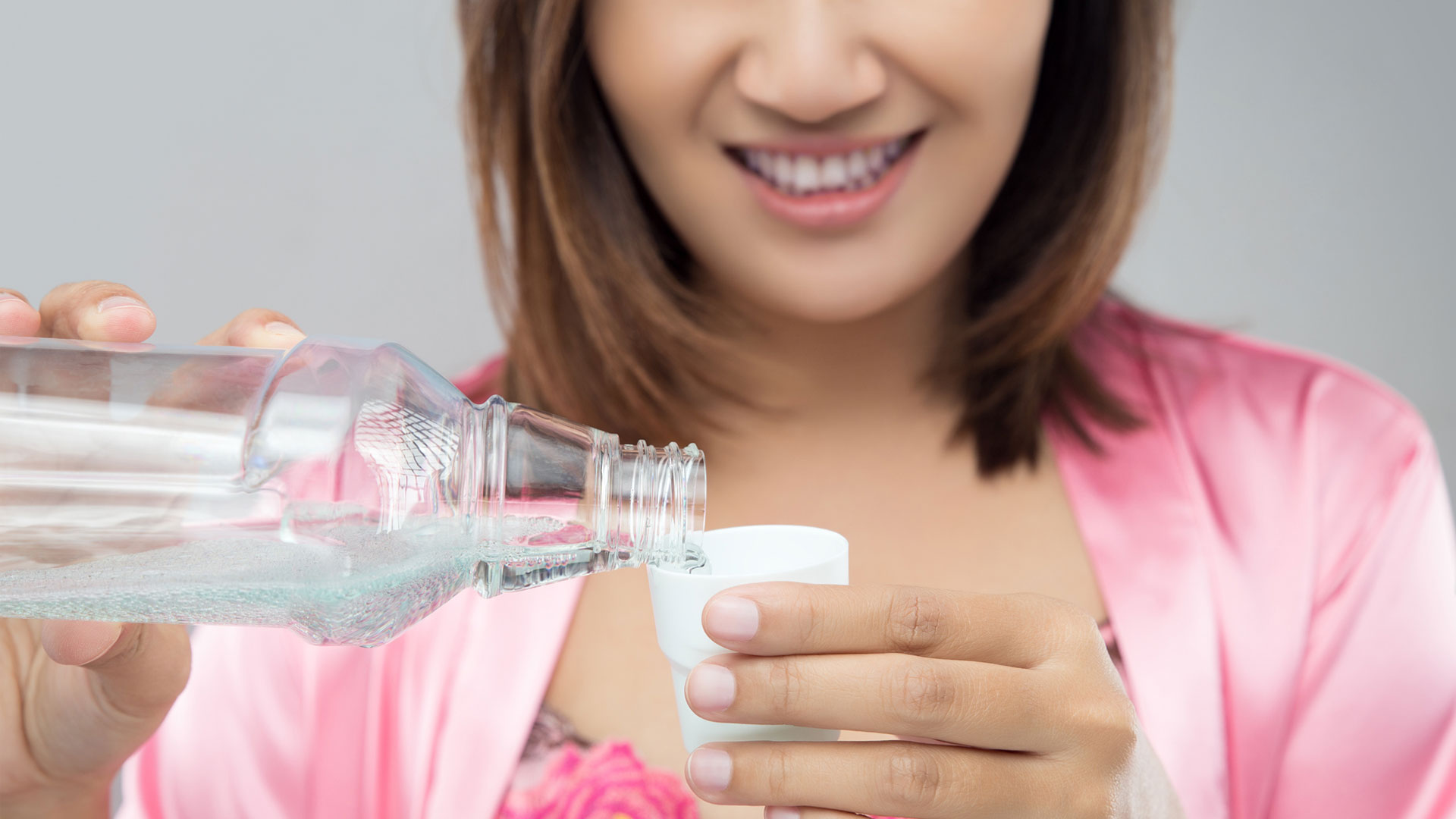
>>>>> Read more: How much does dental bone graft cost 2022?
Dental bone graft aftercare guide and tips
Dental bone graft aftercare is needed to follow and apply with a proper procedure.
- Take all medications as prescribed by your doctor. After surgery, you should take 1 pain reliever before the anesthetic wears off. Antibiotics can also be prescribed by your doctor to reduce the risk of wound infection, make sure to take them as directed until the prescription is gone. When any unusual reaction to the drug occurs, please call us to promptly handle it.
- Bone grafts are made up of many small and fine bone particles. So don’t worry if you see small particles in your mouth for the first few days after surgery. To minimize the number of particles that scatter and fall out, you need: Do not spit, blow your nose or rinse your mouth too vigorously for the first 3 to 5 days after surgery as well as avoid touching your tongue or touching the surgical site with your hands as this may cause injury to the suture.
- In the case of bone implants in your jaw, near your sinuses, or if sinus surgery is performed, blood may flow slightly from your nose for a few days. If the nosebleed is heavy or the bleeding persists, please call us immediately. Avoid blowing your nose for 14 days if you need sinus surgery and use decongestants regularly if prescribed.
- If a temporary tooth is placed on your implant, do not bite into this tooth until your implant has completely healed.
- Bleeding is normal for the first 24 hours after surgery. If the bleeding is heavier and doesn’t stop, place a folded damp gauze or tea bag on the area and bite hard & continuously for about 20 minutes. (Repeat as needed). Note: If bleeding continues, please call us immediately.
- Brush your teeth gently and avoid the surgical area until completely healed. Avoid using an electric toothbrush or water floss around the surgical site. In addition, you can gently rinse your mouth with alcohol-free mouthwash or warm salt water to effectively disinfect and ensure faster-wound healing.
- Eat and drink soft, liquid foods such as soup, yogurt, ice cream, mashed potatoes, and pudding,… for at least 3 days after surgery to avoid a strong impact on the wound. You can return to your normal diet once your mouth is able to tolerate solid foods.

- Numbness can last up to 24 hours after your procedure. Call us if your numbness persists after that
- Avoid smoking for at least 21 days and possibly longer because smoking is a direct harmful agent to the wound healing process.
- If you are using birth control and are prescribed antibiotics, please inform your doctor as this may affect the effectiveness of the medicine.
- If unusual problems arise, please contact us immediately via the phone number provided.
- Gargling too much after treatment may increase bleeding in the mouth. You should limit this if possible. You should also avoid drinking through a straw because negative pressure can deflect some grafts.
- You should not do any physical activity for the next 2-3 days after treatment. Especially in severe cases, you may be advised to avoid strenuous physical activity for up to 6 months to ensure your bone graft has enough time to heal.
Dental bone graft aftercare is extremely important because it greatly affects the success of the surgery. If you are likely a candidate for bone grafting, contact us as soon as possible to schedule an appointment. You can request an appointment online, call us at our hotline or fill out the appointment online form.
Hotline: 0868.134.138 – 0346.134.138
>>>>> View more: Ava Dental Clinic Fanpage

